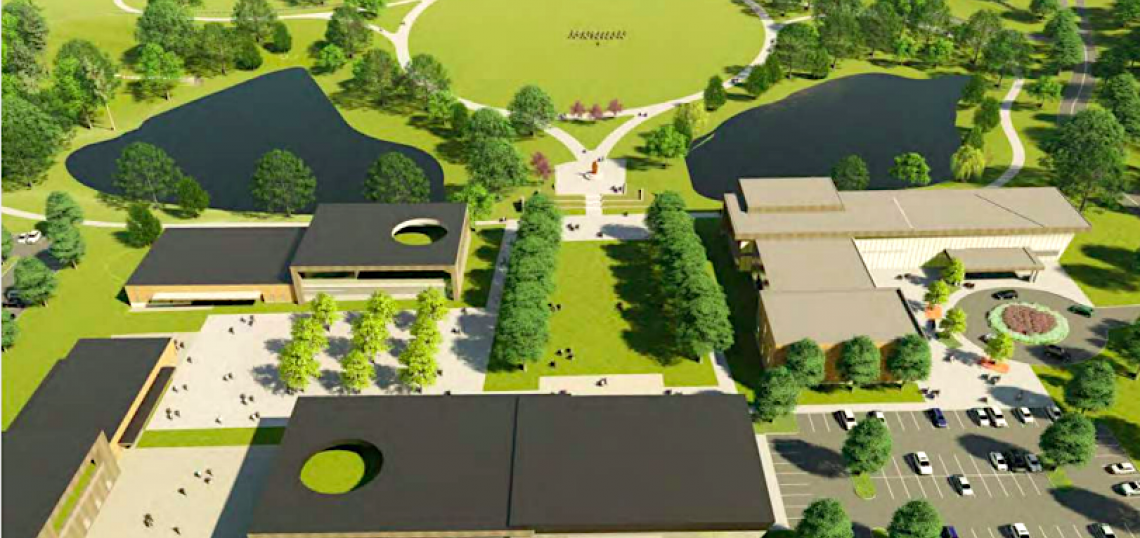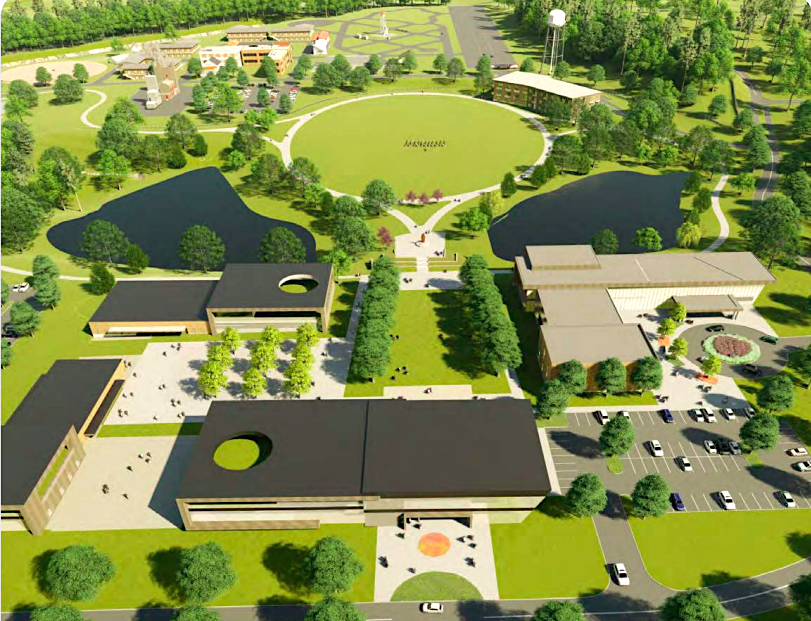By now, you’ve probably seen the yard-sign campaigns, broadcast news coverage, or newspaper editorials. The uproar, on both sides, is becoming cacophonous.
The city’s proposal to build a cutting-edge training complex for Atlanta police and firefighters on 150 acres of southside forestland is one of the summer’s hottest topics—and possibly the most heated, development-related debate since the squabbling over tax incentives to kickstart the Gulch redevelopment downtown three years ago.
On one side, the Atlanta Police Foundation, alongside various fire, police, and government heads, argue the proposed $90-million complex would replace outdated training facilities and bolster the recruitment, retention, and morale of public safety professionals in the city—while adding public-accessible park space in the forests south of East Atlanta and Gresham Park.
On Sunday, the Atlanta Journal-Constitution’s Editorial Board voiced support for the plans, calling enhanced training facilities a vital tool in combating troublesome, recent crime spikes in the city.
The impassioned counterargument has come from environmental groups, urbanists, everyday Atlantans with “Defend the Atlanta Forest” signs in their front yards, and social-justice protesters on the steps of City Hall rallying against what they perceive as a “Cop City” and unnecessary expenditure. (It’s been more derisively described by national media as a “massive new police fantasyland.”) Furthermore, opponents argue, public engagement in the process has been lacking.
A host of southeast Atlanta neighborhoods, comprised of more than 20,000 people, have passed resolutions this summer against the police-fire complex, arguing the acreage is more valuable as passive greenspace, natural wildlife habitat, and maybe walking trails one day. The Kirkwood Neighbors Organization was the latest to join that chorus Tuesday, passing a resolution that supports the idea of enhanced training facilities—but rejecting the city’s chosen location.
So, about that site.
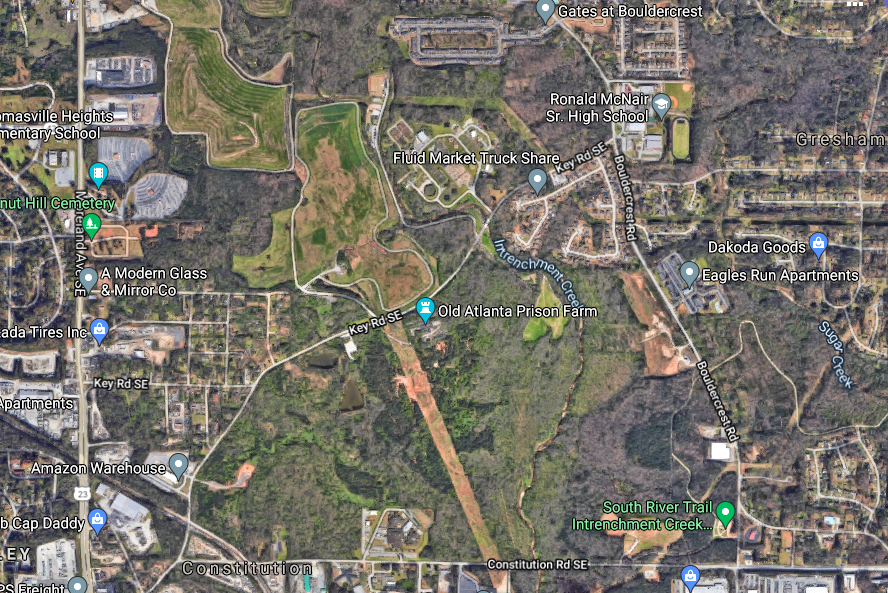 An overview of the site in question, located about six miles from downtown Atlanta. Moreland Avenue is at left, while the southern section of Interstate 285 is just below. Atlanta Police Foundation
An overview of the site in question, located about six miles from downtown Atlanta. Moreland Avenue is at left, while the southern section of Interstate 285 is just below. Atlanta Police Foundation
With its partners, the city conducted a “comprehensive assessment” of all property in the city’s portfolio and concluded the best spot for a state-of-the-art training compound would be 150 dormant acres along Key Road, next to Atlanta police’s current shooting range and tactical training facilities. It’s the Old Atlanta Prison Farm, located about six miles from downtown. The city has owned the 350-acre swath of southside land in unincorporated DeKalb County for a century.
The site is just north of the sprawling Blackhall Studios television and film production complex, and South River Trail Entrenchment Creek, a popular recreation destination.
Using a mix of public and private funding (the city would be on the hook for $30 million across the next three decades), the $90-million training facility would rise in phases.
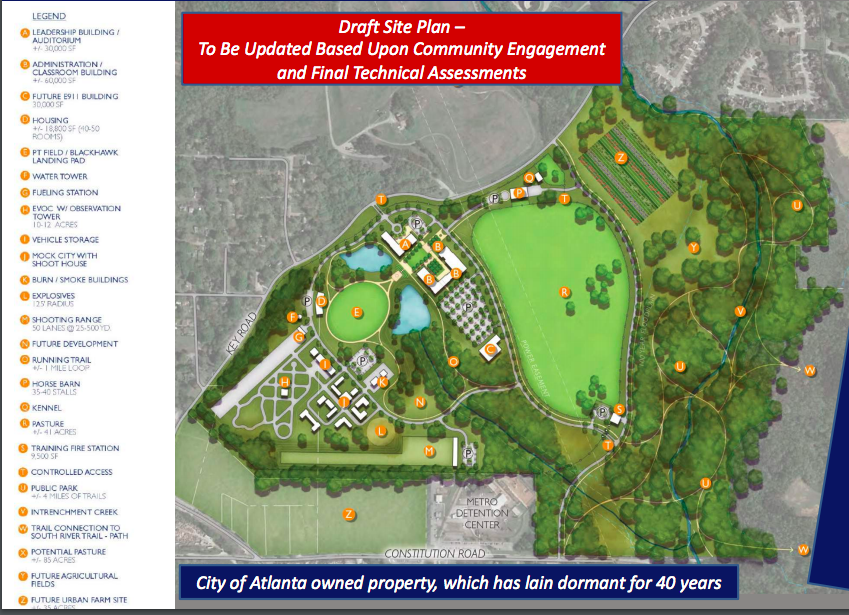 Tentative breakdown of planned uses at the now $110-million training complex, as approved by Atlanta City Council in 2021. Atlanta Police Foundation
Tentative breakdown of planned uses at the now $110-million training complex, as approved by Atlanta City Council in 2021. Atlanta Police Foundation
Facets of the training facility would include classroom buildings, a 50-lane shooting range, a section for explosives, burn/smoke buildings, a mock city with a “shoot house” for training, but also four miles of public trails and other greenspaces.
According to the Atlanta Police Foundation, the site is a half-mile from the nearest homes and has few hardwood trees but a major utility easement and new-growth invasive species. The Foundation has pledged to build the first phase, using corporate and philanthropic donations.
Any hardwood tree removed during construction will be replaced with 100 more, according to the Foundation, which argues its plans would not destroy old-growth forest.
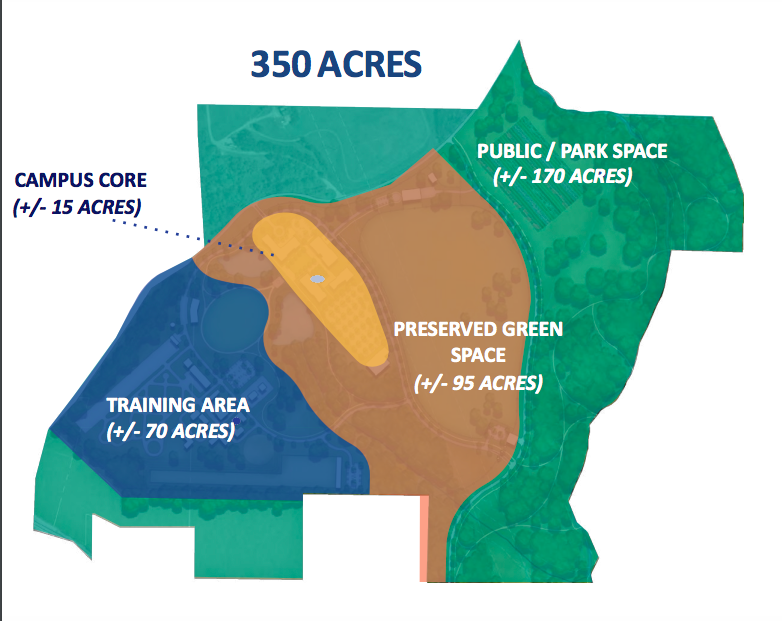 How the police and fire training facility would fit with forested acreage in the area, as supporters envision it. Atlanta Police Foundation
How the police and fire training facility would fit with forested acreage in the area, as supporters envision it. Atlanta Police Foundation
Not so fast, say environmental advocacy groups, including those that have lobbied for years to create South River Forest. That potentially 3,500-acre assemblage of parkland would be larger than Stone Mountain Park, but within the Interstate 285 perimeter.
BeltLine visionary Ryan Gravel, who also works with Nature Conservancy, calls the Atlanta Prison Farm property the “essential centerpiece” of that grand forest vision. Gravel argues the rushed training complex deal was made “in secret” this year in response to panic over rising crime rates.
Meanwhile, 16 environmental groups around Atlanta collaborated on a letter sent to city council members and Mayor Keisha Lance Bottoms earlier this month, arguing the training center plans will fragment the South River Forest and “leave the surrounding areas susceptible to stormwater flooding, which is Atlanta’s top natural disaster.” That group includes the South River Forest Coalition and Sierra Club Georgia Chapter.
So, where does all this stand now?
The Atlanta City Council voted last week (narrowly, 8-7) to table a vote on whether to lease the southside acreage to the Atlanta Police Foundation, a necessary step before construction could start.
The tabled, hot-button proposal could again be up for vote at the next council meeting, a week from Tuesday.
Pretend you’re on the city council, if you aren’t. Which way would you vote today?
• Days could be numbered for gigantic parking lot near East Atlanta (Urbanize Atlanta)




